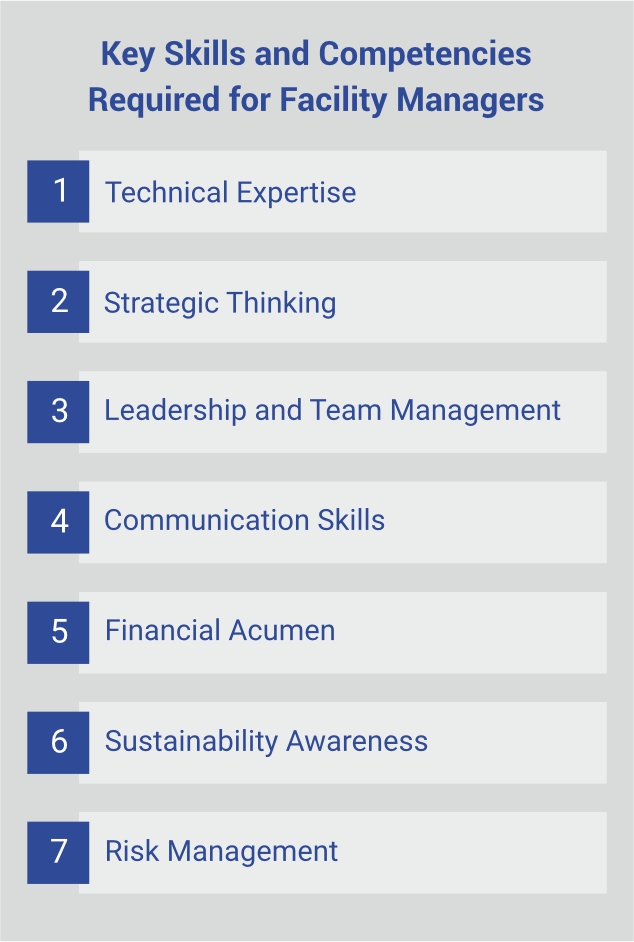Introduction:
Facility management has evolved significantly over the years, transitioning from traditional maintenance roles to a more integrated and strategic approach. Facility managers now play a critical role in ensuring the seamless operation of facilities while aligning with broader organizational goals. This blog explores the pivotal role of facility managers, the skills and competencies required for success, and the training and development opportunities available in this dynamic field.
The Importance of Facility Managers in an Integrated Approach
In today’s complex business environment, the role of facility managers extends beyond routine maintenance and operational tasks. They are responsible for creating a safe, efficient, and sustainable environment that supports the organization’s core activities. The integrated approach to facility management focuses on combining various services such as maintenance, cleaning, security, and energy management into a cohesive system that enhances productivity and reduces costs.
Facility management companies in India are increasingly adopting this integrated approach to offer comprehensive Facility Management Solutions that cater to the diverse needs of their clients. This holistic method ensures that all aspects of facility management work in harmony, leading to improved operational efficiency and a better user experience.
Key Skills and Competencies Required for Facility Managers
To excel in their roles, facility managers need a diverse set of skills and competencies. These include:

1. Technical Expertise:
Facility managers must have a strong understanding of the technical aspects of building systems, including HVAC, plumbing, electrical, and structural components. This knowledge allows them to oversee maintenance activities effectively and ensure the longevity of facility assets.
2. Strategic Thinking:
An integrated approach to facility management requires strategic planning and decision-making. Facility managers need to align their activities with the organization’s long-term goals, focusing on sustainability, cost-efficiency, and employee satisfaction.
3. Leadership and Team Management:
Managing a diverse team of professionals is a critical aspect of the facility manager’s role. Strong leadership skills are necessary to motivate and guide the team, ensuring that all tasks are completed efficiently and to a high standard.
4. Communication Skills:
Effective communication is vital for facility managers to interact with various stakeholders, including employees, clients, and service providers. Clear and concise communication helps in conveying important information and resolving issues promptly.
5. Financial Acumen:
Facility managers need to manage budgets, control costs, and ensure that the facility operates within financial constraints. A strong grasp of financial principles and cost management strategies is essential for optimizing resources and delivering value.
6. Sustainability Awareness:
With the growing emphasis on sustainability, facility managers must be knowledgeable about green building practices, energy efficiency, and waste management. Implementing sustainable practices can lead to significant cost savings and environmental benefits.
7. Risk Management:
Facility managers are responsible for identifying potential risks and implementing measures to mitigate them. This includes ensuring compliance with health and safety regulations, conducting regular inspections, and preparing for emergencies.
Training and Development Opportunities for Facility Managers
The dynamic nature of facility management necessitates continuous learning and development. Various training programs and certifications are available to help facility managers enhance their skills and stay updated with industry trends.
1. Professional Certifications:
Obtaining professional certifications can significantly boost a facility manager’s credentials and career prospects. Some of the top certifications include:
- Certified Facility Manager (CFM): Offered by the International Facility Management Association (IFMA), this certification covers a wide range of facility management competencies.
- Facility Management Professional (FMP): Also offered by IFMA, the FMP certification focuses on the foundational knowledge required for effective facility management.
- Sustainability Facility Professional (SFP): This certification emphasizes sustainable practices in facility management, helping managers implement eco-friendly solutions.
2. Training Programs:
Various training programs are designed to address specific aspects of facility management. These programs can be tailored to the needs of the organization and the skill levels of the participants. Common training topics include:
- Building Systems and Maintenance: This training provides in-depth knowledge of building systems, maintenance techniques, and troubleshooting methods.
- Leadership and Management Skills: Focused on developing leadership qualities, this training helps facility managers enhance their team management and decision-making abilities.
- Health and Safety Compliance: This training ensures that facility managers are well-versed in health and safety regulations, risk assessment, and emergency preparedness.
3. Continuous Professional Development (CPD):
Engaging in CPD activities allows facility managers to stay updated with the latest industry developments and best practices. Attending industry conferences, workshops, and webinars are excellent ways to gain new insights and network with peers.
4. Online Learning Platforms:
Online learning platforms offer a flexible and convenient way for facility managers to enhance their skills. Courses on topics such as project management, financial management, and sustainability are readily available and can be accessed from anywhere.
The Role of Facility Management Companies in Supporting Development
Top facility management companies in India play a crucial role in supporting the development of their facility managers. These companies often provide access to training resources, mentorship programs, and opportunities for professional growth. By investing in the development of their workforce, these companies ensure that their managers are well-equipped to deliver high-quality Facility Management Services in India.
Conclusion
The role of facility managers is pivotal in the successful implementation of an integrated approach to facility management. By possessing a diverse set of skills and competencies, facility managers can contribute significantly to the efficiency and sustainability of their organizations. Continuous training and development are essential for keeping up with the evolving demands of the industry.
Facility Management Companies in India must prioritize the development of their managers to ensure they can provide comprehensive and effective Facility Management Solutions. With the right support and resources, facility managers can excel in their roles, driving the success of their organizations and setting new standards in Facilities Management India.
Industries we serve:
Automobile | Manufacturing | Pharmaceutical | Oil and Gas | Healthcare | Ancillary | FMCG | Education | Real Estate | Commercial | Mining | Hotels
Also read: The Economic Benefits of Investing in Industrial Landscaping

